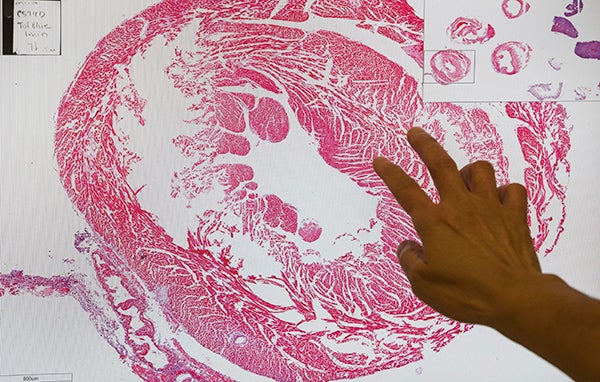Funding opportunities announced for biomaterial researchers
East Carolina University’s Biomaterials Research Cluster announced that it will provide seed funding for up to four faculty-supported research projects this academic year, totaling up to $12,000 per project.
Projects can span the full range of the cluster’s research priorities, including the areas of biomechanics, radiation, biosensors and nanoparticle research. Collaborative research teams are encouraged and projects should have a clear path forward for future funding opportunities.
Project primary investigators must be members of the cluster and are encouraged to register online for membership. Projects should be submitted to the Biomaterials Research Cluster Seed Grant Program portal by Aug. 31.

The East Carolina University Biomaterials Research Cluster announced a new project seed funding program July 20 at the Division of Research, Economic Development and Engagement STEM@StarLight event. The program will fund up to four biomaterials related projects this year. (Photo by Cliff Hollis)
The announcement came at the July 20 virtual STEM@Starlight event, sponsored by the Division of Research, Economic Development and Engagement (REDE) and the North Carolina Biotechnology Center.
The event focused on cardiovascular science and biomaterials connections and featured six speakers from ECU. Headlined by cardiovascular science professor Douglas Boyd, the featured researchers shared their biomaterials work and how the future of heart health care is changing thanks to biomaterials like extracellular matrixes (ECM) and blood clotting polymers.
Boyd, who is recognized for his pioneering work in cardiothoracic surgery and for his use of robotic-assisted surgical systems, shared his work with ECM grafts to repair heart tissue.
Extracellular matrices serve as internal scaffolding for tissues and organs and provide structural support. These biomaterials are the “future of heart surgery,” Boyd said, and can be successful in repairing and regrowing heart tissue more effectively than other materials, like stem cells. They have also been used to repair blood vessels and as biodegradable stents.
Boyd said that ECU’s infrastructure and faculty provide the perfect place to test new extracellular matrix techniques.
“ECU is positioned to develop and apply novel ECM cardiovascular regenerative treatments, procedures and delivery systems,” Boyd said. “We have the opportunity to develop enhanced ECM regenerative products because of our access to the necessary materials to develop this type of tech and because of our infrastructure to do animal studies and human clinical trials.”
Also presenting at the event were physiology assistant professor Lisandra E. de Castro Brás, engineering associate professor Stephanie George, physics assistant professor Nathan Hudson, engineering assistant professor Ali Vahdati, and physiology associate professor Jitka Virag.
REDE’s STEM@Starlight series is part of the division’s research development event series and is funded by the North Carolina Biotechnology Center as one of its regional research exchange groups. The event provides faculty and guest speaker programs to facilitate project collaboration among scientists and researchers from both ECU and outside the university.
“STEM@Starlight is one of our most popular research development venues,” said Mary Farwell, assistant vice chancellor for research compliance. “ECU is unique in having both medical and engineering programs. Events that bring together researchers across these disciplines and others are extremely important to grow our research enterprise.”
The division plans to continue hosting STEM@Starlight events in an online format until social distancing restrictions are lifted due to the COVID-19 pandemic.
Learn more about STEM@Starlight online and reach out to the Biomaterials Research Cluster for more information about membership opportunities.